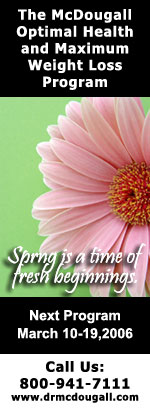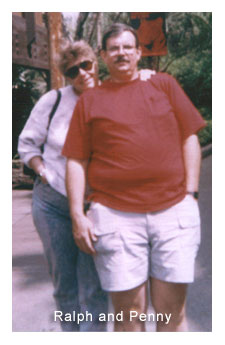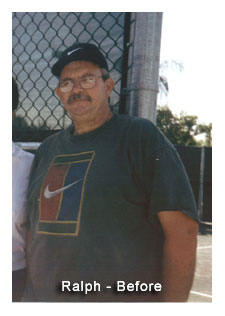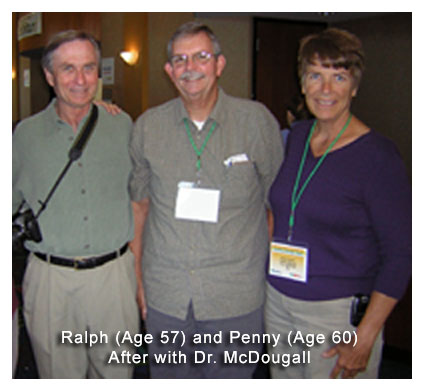|

Dr. McDougall's Comments
Modern medicine can provide many benefits, but it cannot heal
the body from malnutrition caused by overnutrition. Only you
and I can do that. I have been preaching this message for
nearly 30 years now and I am always thrilled to see other
doctors, like Penny’s friend, recommend that people make this
simple change.
One of the most common questions I
am asked is; why don’t other doctors practice diet-therapy? Here
are a few things I have noticed:
1) Diet-therapy is not paid for by
insurance companies, so this makes it hard for doctors to have a
financially successful practice—their family has to eat too.
2) Diet-therapy is not a respected
field of medical research or practice. Revered scientists study
genetics, biochemistry, virology and pharmacology. Surgeons and
specialists are considered next-to-God talented in their
practices. After all, how smart do you have to be to tell
someone to eat beans and rice to cure heart disease?
3) The patient adds an extra
variable to medical care in diet-therapy—they have to perform
the treatment. With surgery all a doctor has to do is cut them
open, and an Internist only has to have them swallow a pill.
4) You have to walk the talk. A
doctor prescribing a healthy diet and exercise must do both.
Steak and cheesecake, and similar fare, are still served at
every noontime hospital conference and Heart Association
meeting.
5) Diet-therapy is not “the
community standard of practice.” In a malpractice suit you are
judged by this standard, and if you practice like other doctors,
even if the patient dies, you are on the right side of the law.
6) Doctors never learn to make
referrals to diet-therapy—they refer to the specialist,
including the psychiatrist, but rarely the dietitian.
7) In medical school today, training
students receive essentially no education on diet-therapy.
8) A very few doctors may realize
that diet-therapy is counterproductive—if the patients became
well, they would no longer be patients. Those running the
pharmaceutical companies, however, do realize the danger of the
public becoming aware of the true potential of diet vs. drugs—so
they fund research and place advertisements that directly attack
the truth.
The bottom line is to not expect help from your
doctor on matters of chronic disease, but instead to learn about
the benefits of a low-fat vegan diet, exercise, and clean habits
and free yourself of the medical businesses.


Use the blue buttons below to subscribe, unsubscribe or to change your e-mail address.



|

The events that began September
2004 were life-changing for me (Ralph). While visiting our
middle daughter and her husband in Indiana, I fell ill—I
knew something was seriously wrong. After returning to
California, the next day I sought out medical help. My
doctor diagnosed me with atrial fibrillation—a heart problem
where the top chambers of my heart (the atria) beat so
rapidly and irregularly, they would appear like a bag full
of worms. I spent the night in our local hospital’s ICU
Cardiac Unit where the cardiologist performed further
testing to try to determine what was causing such an
erratic, fast heartbeat. No cause was found and
fortunately, except for the rhythm, my heart was strong.
Neither my wife, Penny, nor
I, have our physicians on our regular payroll—in other
words, we avoid seeing doctors, even though we work with
doctors all day long at Loma Linda University Medical Center
in Southern California. At the time of my diagnosis, I was
only taking medication for hypertension, and then with the
atrial fibrillation, I was placed on additional medication—Cardia,
Toprol, and Coumadin—I hate taking medicine (don’t we all).
This was the first serious illness of my entire life, even
though my weight at this time had ballooned to over 300
pounds.

From September 2004 through
April 2005, I was cardioverted (a procedure that
electrically shocked my heart) five times, and after each
treatment, my heart returned to normal rhythm, but only for
a short time. Along the way, my cardiologist mentioned that
it would be good for me to lose weight, not just for my
health, but in the event that I would have to undergo cardiac ablation therapy—a 3 to 4 hour heart surgery
with general anesthesia designed to put me into a normal
rhythm; hopefully, permanently.
After the 3rd
cardioversion, in November 2004 Penny and I decided to get
serious about our weight loss. I needed to lose at least
100 pounds and she needed to lose 50 pounds or more. Over
the past 35 years, we had gone on many different programs
with the goal of looking “thin” and gaining optimum health.
We’ve joined Weight Watchers at least three separate times,
tried Barry Sear’s Zone Diet, the South Beach Diet, Fat
Flush Plan, and GI (Glycemic Index) diet —and for various
reasons we never stuck with any of them, Our next serious
attempt at weight loss was a program sponsored by the Loma
Linda Center for Health Promotion called Optifast—a daily
regimen of protein-powder drinks, supervised by doctors,
nurses and dietitians. We did lose weight quickly, but as
Dr. McDougall would tell us later, this qualified as a “make
you sick” program and the results are only temporary.
While on Optifast, one of the
doctors Penny worked for in the Neuroradiology Department at
Loma Linda University Medical Center loaned us an audio tape
by Dr. McDougall. We then watched the videos. By this time
we were totally convinced that we needed to make this
lifestyle change…immediately and permanently! The decision
to take this path was very scary and the program at this
point did not seem easy, but we dropped out of Optifast and
we went fully on a low-fat, vegetarian diet.
Since then I have dropped
over 80 pounds and am still losing. I have stayed in normal
rhythm (no more cardioversions) for over 10 months now. I
no longer have hypertension and my cholesterol is the lowest
it has ever been. Many of my friends comment on how much my
tennis has improved. I can now get to shots that before I
would just have to applaud.

I (Penny) have been an
athlete my entire life despite being overweight. (I’d hate
to think of how heavy I would have become had I not been
used to exercising on a daily basis.) I should have known
better because my college degrees were in health, physical
education, and recreation. I have read many popular books
on nutrition and always shared them with Ralph—we felt we
knew what to do to stay healthy. Yet we never found a true
path for success…until now!
I played tournament tennis
during my teenage years and had a junior national ranking.
Immediately after starting the McDougall program my tennis
game improved with quickness in my footwork and increased
endurance. By August 2005, I had won 2 coveted bronze balls
(awards) for singles and doubles at the Indoor National
Tennis Tournament in Seattle. This was the first time I had
accomplished this in a singles tournament. I like the
competitiveness of the single matches, but I also love the
teamwork of doubles. So far, I (Penny) have lost over 66
pounds and my health has improved greatly.

There are
temptations every day and we do have cravings, because we
love all kinds of food—fortunately, we also love our new
healthy meals. For the most part we are satisfied, which was
not the case with every other diet we have been on.
We don’t feel deprived now. Besides, we know that if we
truly want something we can have it. But we are able to
resist most of the time because we see how far we have come
with our improved health and weight loss. We are a work in
progress, always improving. We now find it comical to watch
people watch us eat at the cafeteria at the Medical Center.
They can’t help staring at our plates. But this just gives
us another opportunity to spread the word about the
McDougall Program.

We
encourage you to pass this Star McDougaller along to
friends.
 2006
John McDougall All Rights Reserved 2006
John McDougall All Rights Reserved
McDougall Wellness Center P.O. Box 14039,
Santa Rosa, CA 95402
https://www.drmcdougall.com |
|
|
|







